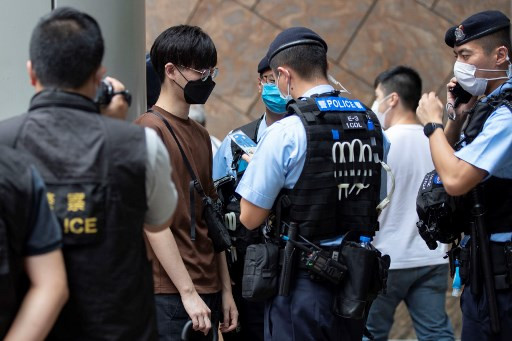Popular Reads
Top Results
Can't find what you're looking for?
View all search resultsPopular Reads
Top Results
Can't find what you're looking for?
View all search resultsHong Kong starts mass virus testing as China distrust swirls
Change text size
Gift Premium Articles
to Anyone
 Police stop and question a man outside a shopping mall during a planned demonstration on the eve of the first anniversary of the Prince Edward MTR station incident, where police stormed the station to make arrests against massive anti-government protests last year, in Hong Kong on August 30, 2020. (AFP/May James)
Police stop and question a man outside a shopping mall during a planned demonstration on the eve of the first anniversary of the Prince Edward MTR station incident, where police stormed the station to make arrests against massive anti-government protests last year, in Hong Kong on August 30, 2020. (AFP/May James)
H
ong Kong started conducting mass coronavirus tests on Tuesday, a health scheme that has been swept up in the political debate dividing the city, where many remain deeply distrustful of both local leaders and China.
The voluntary tests are part of an attempt to stamp out a third wave of infections that began in late June and saw the densely populated city reimpose economically painful social distancing measures.
The program has been hampered by a limited response due to the involvement of mainland Chinese testing firms and doctors -- and swirling public fears of data and DNA harvesting as Beijing cracks down on the city's democracy movement.
Since registration began on Saturday, 510,000 people have signed up to take the free tests -- around seven percent of the city's 7.5 million population.
More than half of all 141 community test centers across the city are fully booked for their first day on Tuesday.
But health experts advising the government have said as many as five million people might need to be tested for the scheme to comprehensively uncover hidden transmissions and end the current wave.
Hong Kong has recorded just over 4,800 infections since the virus first hit the city in late January but about 75 percent of those cases were detected since the start of July.
Tests began at 8am (0000 GMT) on Tuesday and will run for between a week and two weeks depending on public demand, with numbers limited each day to reduce the risk of infection.
Authorities have billed the scheme as a benevolent public health initiative made possible with Chinese help.
'Anti China radicals'
But the involvement of mainland China has sent the rumor mills into overdrive and compounded fears of Beijing's surveillance state, which uses biometric data to monitor its citizens.
Some prominent Hong Kong health experts have also questioned the efficacy of a mass testing program, arguing that more targeted monitoring of at-risk and vulnerable communities would be a better use of resources.
They have also raised concerns that the act of testing so many people might itself help spread the virus in a city where emergency rules currently forbid more than two people gathering in public.
A group of pro-democracy politicians and lawmakers, including prominent activist Joshua Wong, called on the public on Sunday to boycott the test.
They voiced fears of mass DNA harvesting and concerns Hong Kong might introduce a mandatory health code system like those used on the mainland.
Hong Kong's government has repeatedly rejected those concerns, denying DNA would be taken and insisting that no tests would go to mainland labs.
City leader Carrie Lam, a pro-Beijing appointee, slammed those opposed to the testing scheme as "active anti-Beijing, anti-government members" who "will not spare any chance to create troubles and stir up confrontations even when it comes to a public health issue".
Beijing's Hong Kong and Macau Affairs Office called those opposed to testing "anti-China radicals" with a "vile disregard" for public health.
Last week Lam also dismissed doctors who voiced concerns about the efficacy of city-wide testing as being politically motivated, angering some in the medical community.
At the height of the third wave in late July, Hong Kong was recording about 150 new coronavirus cases a day.
Citing the rising infections, Lam cancelled local legislature elections for a year, sparking uproar from the city's pro-democracy camp, which had hoped to capitalize on seething public anger after last year's huge protests.
Cases have since fallen back to single digits, with just nine new infections on Monday, and government opponents have questioned why elections needed to be cancelled if the government could also conduct city-wide tests.
Authorities have said mass testing is a needed emergency health measure and that it will be conducted over multiple days, unlike an election.









